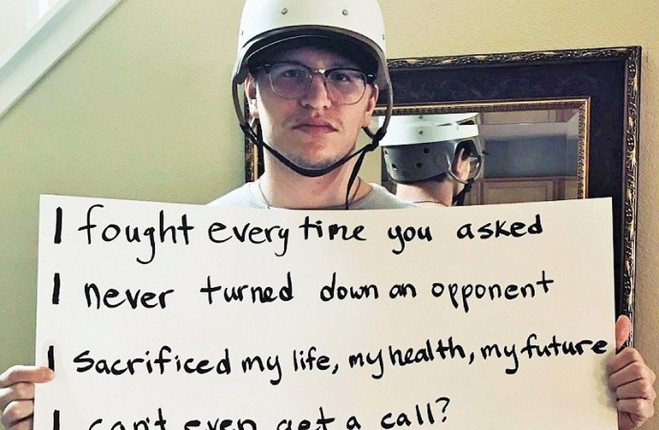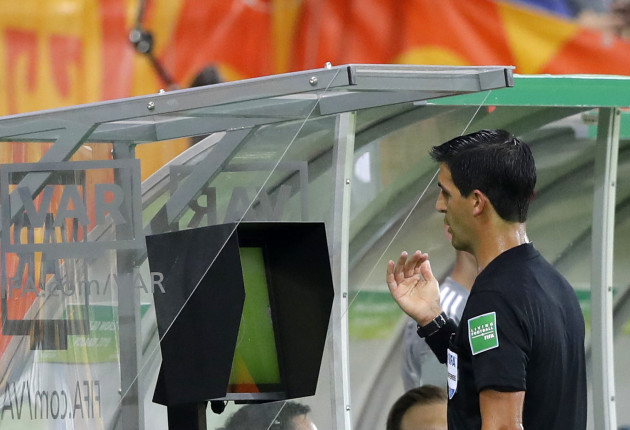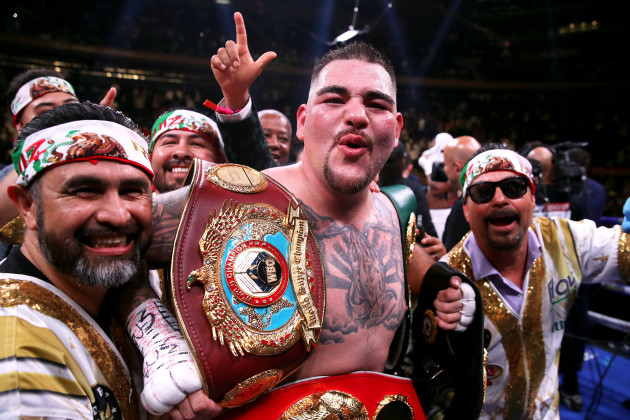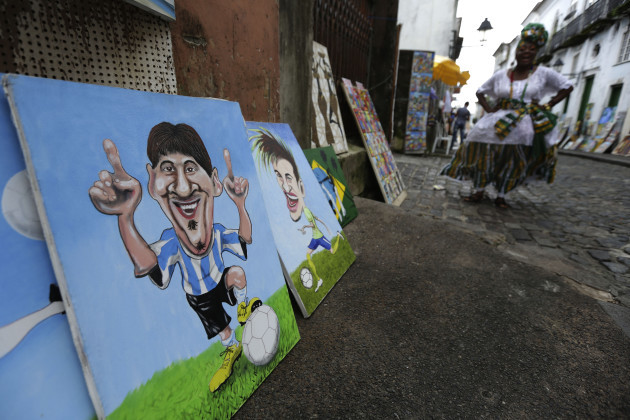1. Once again I am hugely grateful to the community that will not allow us to forget the great under-reported story of this Women’s World Cup: men. Most specifically, the men who are not watching it. We hear so much about the tournament itself. Too much, it is argued – and at the expense of one of the four great civil rights questions of our era: 1) When are we getting a White History Month? 2) When is International Men’s Day? 3) Isn’t it time we had Straight Pride? and 4) Can you imagine how sexist people would say it was if we had a men’s World Cup?
I could not agree more with the gentlemen who dare to ask these questions – and not just so that I can buy time while I frantically locate the exit. Indeed, as part of this column’s tireless commitment to celebrating the underdogs, this week let’s redress the dangerous cosmic imbalance caused by the Women’s World Cup. Here follows a celebration of all the different guys who currently need to explain to you – at length – why they aren’t watching it. As always, you don’t have to be a woman to have met some of these men over the past week. But it certainly helps!
Mr Stop Shoving It Down My Throat
Listen, this guy is absolutely fine with this tournament existing, being alive, whatever. He’s open-minded – it’s not the dark ages any more. Nothing against it. What he objects to – and he’d like you to know that you’ll find a lot of other perfectly decent people like him – is it being “shoved down his throat”. Yes, it’s the shoving. Down the throat. It’s like: fine. I’m happy for you to do your football in the privacy of your own wherever, but please: have some sensitivity and realise that not all people are like you. So basically just don’t do it in front of him, or involve him. Seriously: don’t involve him. Also don’t do it near his kids, especially the girl. For reference, ways that it can be shoved down his throat include “being on TV” and “being on a website he normally looks at”, for instance that of the British Broadcasting Corporation, which, by covering a sport that averaged 4.6 million viewers on Sunday night for England’s game against Scotland, is pursuing a right-on agenda. Actually, let’s be real for a minute: no one wants to see this. Put it away.
Mr Inferior Product
Nothing but respect for the guy who declares “the game’s gone” about every tiny piece of commercialisation in men’s football, but falls over himself to describe the women’s game as “an inferior product”. I mean, on the one hand, a reminder: if you refer to football as either “product” or “content” – ever – you are an endless wanker. No exceptions. But on the other: I’m sure it felt like an interesting point when you made it.
Marina Hyde pities the poor man who’s had the Women’s World Cup ‘shoved down his throat’.
2. Similarly important to understand is that I do not care if VAR gets every decision right or gets them all wrong. I don’t care if it remains ridiculously clunky and time-consuming or becomes seamlessly integrated. It’s not about that, as horrible as the process currently is, it is about the principle.
I simply do not want real-time sport paused to be inspected for mistakes. To me, that stops it being human and makes it more like a cold computer game, albeit a poor one where we’re forever waiting for the data to be processed by an overheating chip. The more we try to strip human failings out of sport, the less human it inevitably is. In other words I like imperfection and do not want technology to remove it.
The variables of human adequacy, by officials, every bit as much as by players, is the key to the unpredictability of sport and thus to the excitement. I wholly and totally accept that wrong decisions will be occasionally made. It does not bother me at all. It is not a flaw and I don’t want it fixed.
I’m also not sure that those who are so in love with the oft-repeated mantra of just ‘getting the decisions right’ understand fully what other evils have been released from opening this punishingly over-officious Pandora’s Box. Once you insist on VAR, you come up against a big problem: you cannot separate any moment in a football game from the last. It is an interrelated network of events each influenced and geared by the previous. So a wrongly awarded throw that leads to a goal 28 passes down the line is, in this authoritarian universe, an affront to fairness. Such a goal should be checked and disallowed, but right now it wouldn’t be. Yet VAR is nothing if it is not an absolutist religion. To restrict its use is to compromise the premise upon which its existence relies: the desire to get decisions right. So once you welcome VAR, how can you argue against the expansion of it? You can’t. It’s not a sustainable position to take because you’re going against your very own reasons for adopting VAR in the first place.
John Nicholson makes his case against VAR for Football365.
3. “Everything I know comes from my dad. He was my mentor, my teacher, my best friend. I lost my dad on 3 March 2007 and the whole world came down on me. I also lost my job as I was involved in boxing with my dad. I lost my house. I hit rock bottom but Sandra, my wife of 25 years, hung in with me.
“She’s actually from the same city as me in Mexico. Guadalajara. Sandra became a US citizen first and she filed papers for me. That’s how I became a United States resident. The moment I became a resident I went to school. I was 34. Imagine being in this country from the age of six to 34 without a passport. Imagine not being able to get a job with decent pay. It was my dream to become a citizen and take care of my family. After I went to school for four years, I got my degree in carpentry. Life is perseverance.”
In 2009, Robles became involved in amateur boxing while training his son. “I was working as a carpenter in the day and going to the gym at night. My fighters started winning regional, state and national tournaments. I started getting recognition. But even when I was a coach on the US national team I wasn’t a citizen. I was a permanent resident. At the world championships in 2011 this other US coach noticed my Mexican passport. He said: ‘You’re not supposed to be here.’ That hurt me so much but, wow, the kids embraced me.”
At those same world championships, Robles met Joshua. “I respect Anthony Joshua, man. He’s such a humble, good person. He wins the silver medal but I thought he deserved gold. After the fight we’re on the bus together. It’s astonishing how mellow this kid is with his silver medal. Who knows how he felt inside?
Donald McRae sits down with Michael Conlan’s former trainer Manny Robles, who steered Andy Ruiz to a victory which shocked the boxing world.
4. There was a moment in Game 6 of the NBA Finals on Thursday that was a happy ending short of becoming NBA lore. In the third quarter, Klay Thompson awkwardly tumbled to the ground, clutching his knee after Danny Green fouled him on a breakaway dunk attempt. It seemed pretty clear upon watching replays of Thompson’s knee buckling that his season was over, just as it had seemed like Kevin Durant’s season was over when something snapped in his leg in Game 5. Thompson was carried off the court and headed back to the locker room.
And then he turned around.
Klay turning around in the tunnel and coming back out to shoot free throws had Oracle going nuts. pic.twitter.com/T111U9aH8e
— SportsCenter (@SportsCenter) June 14, 2019
NBA rules state that a player can’t return to a game if he gets fouled and leaves without shooting his free throws. Thompson knew that his body might keep him out of the rest of the game, but he wasn’t going to let a weird technicality do it. He limped back onto the court with 20,000 fans and about as many decibels supporting him. He drilled his free throws and prepared to play defense before the Warriors stopped play to yoink him out of the game and send him back to the locker room.
It carried echoes of Willis Reed emerging from the locker room in Game 7 of the 1970 NBA Finals, playing a few minutes despite a brutal thigh injury. The difference, of course, is that Reed’s Knicks won. Without Durant and Thompson, the Warriors couldn’t hold off Kawhi Leonard and the Raptors, who won 114-110 to bring Toronto its first championship. While the Warriors didn’t force Game 7 and keep hopes of a three-peat alive, they did do something they hadn’t done in any of their four previous trips to the NBA Finals. For a few minutes, you had to root for the underdog Warriors.
The Ringer’s Rodger Sherman on how the greatest basketball team of its generation briefly became the plucky underdog during the NBA Finals.
5. Roc Nation, Al said, wanted Daniel back in the ring, quickly. They arranged a fight in Mexico, to get Daniel an easy win. And they set up the Haro fight. In training, Daniel looked good, physically. Mentally, Al said, he wasn’t there. Late in training, Al said Daniel began questioning if they should take the fight. “He’s never questioned a fight before,” Al said. “He was always, ‘I can’t wait to fight this guy.’ He always had the mentality of looking big.” A friend of Daniel’s, Al said, had planted the seed that Daniel should back out and find another promoter. “The confidence you wanted to see wasn’t there,” Al said. “Mentally, there was doubt.”
Two weeks before the Haro fight, Al told Daniel he should quit. He told Daniel he didn’t have the right focus. He told Daniel that his relationship with his girlfriend was affecting his training. “It wasn’t her fault, because it’s his decision,” Al said. “But he was more involved with her than he was with what was going on in the ring.”
Daniel denied that his attention was divided. He said he was ready to fight. Al agreed to work with him. But he swore to himself that regardless of what Daniel did, he was done training him. “Maybe I should have stopped then and there,” Al said. “You question yourself. What can you do?”
The punch that changed everything was a straight right hand, a shot that temporarily turned Daniel’s body limp. From the corner, Al thought his knee had given out. He thought he saw his son grab for his leg when he hit the canvas. He got Daniel on the stool. And he heard the first slur. He called for the doctor. The doctor said they needed to go to the hospital.
Chris Mannix takes to Sports Illustrated to tell the tale of Daniel Franco, who survived a two-week coma but is suing his former promoters RocNation.
6. On Sunday, when Philippe Coutinho slotted home a penalty to make it 3-0 against Honduras in a 7-0 rout in what was just a warm-up for the tournament, the rest of the stadium had a very different interpretation. For instance, Tite’s scream, that left dangerously pronounced cables up and down his neck, showed the pressure he’s under as to not win this tournament would likely and wrongly see him sacked after what’s regarded as a World Cup failure.
As for the source of that pressure, it’s from on high rather than from a general public who barely mention it. After all, in Porto Alegre’s Beira-Rio stadium, only 16,000 or so bothered to show up to see what was once the nation’s pride and joy on the eve of a major event. As a contrast, the club who play there, Internacional, have been averaging over 23,000 a home game this season and again last night easily surpassed what the Seleção could muster. Indeed elsewhere on Sunday, while bars were deserted for an international, they began to fill up soon after as the Brasileiro returned having been shunted from its afternoon slot.
The Copa America itself threatens similar lethargy across the host cities. Tonight’s opening game is unlikely to be completely full, although that’s because some upmarket tickets have been priced at 590 reais, or about 60 per cent of a monthly minimum salary. Elsewhere there’s real concern over even the cheapest seats. In Belo Horizonte, for instance, the Bolivia-Venezuela clash has so far shifted 3,600 tickets, while Japan-Ecuador has moved 1,400. It’s led to stories about those working behind the scenes, from cleaners to catering staff, being offered cash to come along and fill the massive void. Perception over reality.
More than in most places, the tribal nature and link to the local of the domestic game here means that you won’t see many Barcelona or Juventus, Manchester City or Paris Saint-Germain shirts pockmarking the place as it’s all about their own team. As an example, back in 2014, with the German away kit based on the Flamengo jersey, many in Rio de Janeiro cheered on the visiting side in the semi-final. Meanwhile in Belo Horizonte, where that 7-1 played out, a trip into a city famed for its many curb-side bars to talk to locals about the result surprised many visiting. That result didn’t bother most as they’d long been priced out and alienated by rumours that Nike push where Brazil play, who they play and, on occasion, what players they play. They instead wanted their clubs, Cruzeiro and Atletico Mineiro, back.
Ewan MacKenna explains why this year’s Copa America in apathetic Brazil is the perfect tournament for its time and place.
7. Justin had gone public with Gabe’s condition in the last days before her passing. On Sunday, June 2, in a long Instagram post, he described Gabe as having lab work that was “incompatible with life,” but then, “Shortly after I told her she was dying, she took a deep breath and yelled NOT TODAY.” Five days later in another post, Justin wrote that Gabe was back in the hospital on June 4, with septic shock, and “told me she was ready to go heaven. This time it was me asking her to wait a bit longer and she agreed.” Then on Sunday night, June 9, Justin posted again: “It breaks my heart to say, but overnight Gabriele’s status worsened with worsening liver function causing confusion. Wanting to do her no harm, we have made the difficult decision to move her to comfort care this afternoon.”
When I talked to Justin on Monday afternoon, he said, “It’s obviously been a long, long road. But in the last few days, Gabriele and I came to a peace with everything.” He said he received more than 5,000 messages in less than 24 hours after his announcement that Gabe was being moved, in which he also wrote: “I wanted to let you all know, while she is still alive so you can send her one last message here or on her wall or on her phone before she heads up to heaven.”
In the two years since I met and wrote about Gabe (and Justin), as the story I had hoped to write about her miraculous comeback became increasingly unlikely, Gabe lived another story altogether. She became a woman—a wife, a daughter, a sister; a runner, a teacher, a mentor; an activist—who simply would not give up in the face of an unbeatable opponent. As a runner, Gabe was a kicker, always full of run at the end. Her coaches always tried to get her to stick her nose in the race a little earlier. She stuck her nose in this one from the gun. Even more, she dragged the rest of us along.
Tim Layden remembers Gabe Grunewald, the runner who never gave up.






